Definition
Charcot-Marie-Tooth (CMT) disease is a group of genetic disorders that affects movement and feeling in the limbs. The disease progresses slowly and causes damage to the peripheral nerves. These nerves control muscles and transmit sensation.
Causes
CMT is caused by defects in specific genes, called a genetic mutation.
CMT can be classified in a number of ways:
- Type I (demyelinating)—This type affects the coating of the nerve called the myelin sheath, causing nerve impulses to travel more slowly. It usually occurs in childhood or the teen years. It is the most common type of CMT.
- Type II (axonal)—This type affects the part of the nerve called the axons. Although the speed is normal, the size or amount of impulses is less than normal. This type of CMT is less common and occurs after the teen years.
- Type III—Also called Dejerine-Sottas disease, this is a more rare, severe, early onset form of CMT. It is sometimes considered to be a subtype of CMT Type I. Symptoms may include:
- Delayed ability to walk due to weakness of the leg muscles closest to the trunk
- Severe sensory problems
- Hearing loss
- Type IV (demyelinating autosomal recessive)—This is similar to Type I, but often less severe. It is less likely to be inherited by an affected individual’s children.

Risk Factors
The primary risk factor for developing CMT is having family members with this disease.
Symptoms
Usually, symptoms first appear in children and young adults. The first sign of CMT is often a high arched foot or difficulty walking. Other symptoms may include:
- Hammer toes
- High arched heels
- Decreased sensation in the feet and legs
- Muscle cramping in legs and forearms
- Flexed toes
- Difficulty holding the foot up in a horizontal position
- Frequent sprained ankles and ankle fractures
- Problems with balance
- Muscle weakness in the lower extremities—can spread to the upper extremities later in life
- Foot drop
- Reduced ability to detect hot and cold, vibration, and position
- Difficulty writing, fastening buttons and zippers, and handling small objects
- Delay in learning how to walk (Type III)
Diagnosis
The doctor will ask about your symptoms and medical history. A physical exam will be done.
- You may have your nerve and muscle function tested. This can be done with:
- Nerve conduction study
- Electromyogram (EMG)
- Your doctor may need to test your DNA. This can be done with a blood test.
Treatment
Although there is no cure for CMT, treatment may help to improve function, coordination, and mobility. Treatment is also vital to protect against injury due to muscle weakness and reduced sensation. Treatment may include:
- Physical and occupational therapy
- Moderate exercise
- Braces on the lower legs
- Shoe inserts to correct foot deformity
- Foot care and routine exams with a foot specialist
- Orthopedic surgery
Prevention
There are no known ways to prevent CMT. If you have CMT or have risk factors, you may want to talk to a genetic counselor before deciding to have children.
